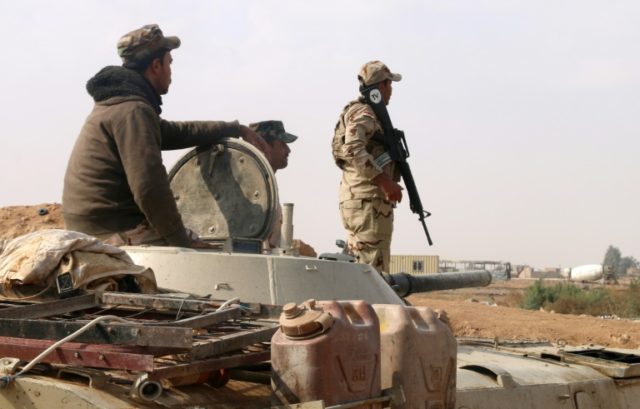Al-Qaeda jihadists have capitalized on the international community’s virtually single-minded focus to annihilate its rival the Islamic State (ISIS/ISIL) to establish dominance over other terrorist groups in the mainly southern part of Syria, a report by the Institute for the Study of War (ISW) alleges.
ISW finds:
The current U.S.-Russia-Jordan ceasefire in Dera’a and Quneitra Provinces provides a conducive environment for al Qaeda to lay the groundwork for its desired safe haven in Southern Syria. Al Qaeda also stands to exploit the decision by the Trump Administration to dismantle a covert program to support vetted opposition factions in Syria by December 2017.
This decision will end the provision of weapons, training, and salaries for thousands of opposition fighters in Southern Syria even as opposition groups and governance structures are struggling to maintain basic security and infrastructure across Dera’a and Quneitra Provinces.
ISW’s analysis found that al-Qaeda has expanded from its stronghold in Syria’s northwestern Idlib province to the southern part of the country, along the borders of Jordan and Israel.
The Institute’s report echoes others assessments, including one by an American Enterprise Institute (AEI) analyst who told U.S. lawmakers in July that al-Qaeda had set the conditions to establish an Islamic emirate in Syria’s Idlib province.
To perpetuate its dominance over the region, al-Qaeda is reportedly targeting opposition forces—including those backed by the United States—that may serve as a viable alternative to Syrian dictator Bashar al-Assad and other jihadist groups.
Similar to the situation in southern Syria, a series of assassinations targeting opposition groups preceded al-Qaeda’s consolidation of power in its Idlib stronghold, where the Free Syrian Army (FSA) once reigned, according to ISW.
For the most part, the terrorist group has targeted U.S.-backed opposition troops.
“The pattern of assassinations against U.S.-backed opposition groups in Southern Syria suggests that al Qaeda is seeking to replicate its success in Idlib Province,” notes ISW. “[Al Qaeda’s Syria affiliate Hay’at Tahrir al Sham] HTS could similarly facilitate attacks against opposition groups in Southern Syria by ISIS-affiliated groups or other jihadist splinter factions in order to maintain a low profile in Southern Syria.”
“Al Qaeda seeks to marginalize remnants of U.S.-backed opposition groups in Southern Syria to create a sustainable power base along the Syria-Jordan border,” it adds.
Already, the terrorist group is believed to be the primary culprit behind a wave of attacks in southern Syria that have killed more than 11 high-ranking anti-Assad opposition commanders and government officials since August, reveals ISW, adding that there have been 42 “attempted assassinations” from August 5 to November 21, 2017.
Of the assassination attempts, more than half have been successful in killing opposition fighters, commanders, or governance officials.
Furthermore, more than 50 percent of the targets have been identified as former or current U.S.-backed opposition groups points out the Institute.
ISW reports:
Al Qaeda is growing stronger in Southern Syria. An assassination campaign targeting mainstream opposition commanders and governance officials is facilitating al Qaeda’s consolidation of power along the borders of Jordan and Israel.
Southern Syria stands at increasing risk of becoming a second Idlib Province, which currently serves as a formidable safe haven for al Qaeda.
Katherine Zimmerman from AEI warned lawmakers early this year that al-Qaeda would absorb the remnants of a defeated ISIS and incorporate the terrorist groups’ capabilities into its own group.
ISW acknowledges:
Al Qaeda’s Syria affiliate Hay’at Tahrir al Sham (HTS) likely seeks to exploit the deteriorating security situation in Southern Syria to advance its own covert assassination campaign against rival governance structures and armed opposition groups.
…
Al Qaeda has previously capitalized on a similar security environment to undermine and co-opt armed opposition groups and affiliated governance structures in Idlib Province. Idlib Province once stood as a stronghold of the Free Syrian Army (FSA) just as Dera’a Province is currently dominated by the FSA-affiliated Southern Front.
Consistent with Zimmerman’s position, Jennifer Cafarella from the ISW also told lawmakers in July that Syria serves as al-Qaeda’s top base.
Both analysts believe al-Qaeda is stronger in Syria than in any other country.
While ISIS has suffered significant losses in Iraq and Syria at the hands of the coalition, its local partners, and even the Iranian and Russian-backed Assad regime, al-Qaeda has thrived.

COMMENTS
Please let us know if you're having issues with commenting.